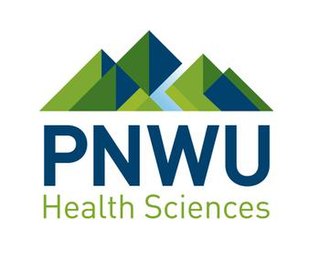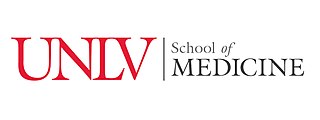
Washington State University (WSU) is a public land-grant research university in Pullman, Washington. Founded in 1890, WSU is also one of the oldest land-grant universities in the American West. With an undergraduate enrollment of 24,278 and a total enrollment of 28,581, it is the second largest institution for higher education in Washington state behind the University of Washington. It is classified among "R1: Doctoral Universities – Very high research activity".
The Liaison Committee on Medical Education (LCME) is an accrediting body for educational programs at schools of medicine in the United States and Canada. The LCME is sponsored by the Association of American Medical Colleges and the American Medical Association.
The University of Oklahoma College of Medicine is the medical school of the University of Oklahoma, located in Oklahoma City. The College of Medicine is part of the university's Health Sciences Center. It is one of only 150 medical schools in the United States that are fully accredited by the Liaison Committee on Medical Education and the only one located in the state of Oklahoma.

Providence Sacred Heart Medical Center & Children's Hospital is a 648-bed general hospital in Spokane, Washington. It employs more than 4,000 health care professionals and support staff; its medical staff consists of over 800 specialists and primary care doctors.

The University of Washington School of Medicine is the medical school of the University of Washington, a public research university in Seattle, Washington. According to U.S. News & World Report's 2022 Best Graduate School rankings, University of Washington School of Medicine ranked #1 in the nation for primary care education, and #7 for research.
Washington State University Spokane, branded as WSU Health Sciences Spokane, is a campus of Washington State University located in Spokane, Washington. It was established in 1989 and, as of 2010, is designated as the university's health science campus. The urban campus is housed on the 48-acre (19 ha) multi-institutional WSU Health Sciences Spokane campus, formerly known as the Riverpoint Campus, in Spokane's University District just east of Downtown Spokane.

Elson S. Floyd was an American educator who served as the 10th president of the four-campus Washington State University from May 21, 2007 to June 20, 2015. Floyd was also the first African American to be named president of Washington State University. Floyd also served as president of the University of Missouri System and president of Western Michigan University. Floyd was the Chairman of the Pac-12 CEO Group.
Most physicians in the United States hold either the Doctor of Medicine degree (MD) or the Doctor of Osteopathic Medicine degree (DO). Institutions awarding the MD are accredited by the Liaison Committee on Medical Education (LCME). Institutions awarding the DO are accredited by the Commission on Osteopathic College Accreditation (COCA). The World Directory of Medical Schools lists both LCME accredited MD programs and COCA accredited DO programs as US medical schools. Foreign-trained osteopaths do not hold DO degrees and are not recognized as physicians in the United States or in other jurisdictions.

Pacific Northwest University of Health Sciences (PNWU) is a private osteopathic medical and health professional school in Yakima, Washington. The university focuses on educating health care professionals to serve "rural and medically underserved communities throughout the Northwest". Founded in 2005, the university's inaugural program was the first new medical school to open in the Pacific Northwest in sixty years. PNWU grants the Doctor of Osteopathic Medicine (D.O.) degree and graduated its first class of physicians in May 2012. Since then, PNWU has continued to expand and now includes the School of Physical Therapy (SOPT), School of Occupational Therapy (SOT), and a School of Dental Medicine (SDM).
The Spokane Public Library and Spokane County Library District system provide the Spokane area with access to information and study space. Secondary education is provided by Spokane Public Schools with its six high schools, six middle schools, and thirty-four elementary schools. Public charter, private, and parochial schools offer more choices of study. Higher education in Spokane is served by the Community Colleges of Spokane system and two private universities, Gonzaga University and Whitworth University as well as various trade and technical schools. The University District in Downtown Spokane is also host to branch locations of regional universities such as Washington State University Spokane and its medical school, the Elson S. Floyd College of Medicine.

The WSU Health Sciences Spokane campus, is an urban 48-acre (19 ha), multi-institutional higher education campus in Spokane, Washington. The campus was established in 1990 by the Joint Center for Higher Education (JCHE) and has been owned and operated by Washington State University since 1998. It is located within Spokane's University District just east of Downtown Spokane, along the southern bank of the Spokane River across from Gonzaga University.

Geisinger Commonwealth School of Medicine (GCSOM) is a private medical school associated with the Geisinger Health System in northeastern and north central Pennsylvania. GCSOM offers a community-based model of medical education with six regional campuses - North, South, Central, West, Atlanticare, and Guthrie. It offers a Doctor of Medicine (MD) Program and a Master of Biomedical Sciences (MBS) Program.

The George Washington University School of Medicine and Health Sciences is the professional medical school of the George Washington University, in Washington, D.C. SMHS is one of the most selective medical schools in the United States based on the number of applicants.

The University of Florida College of Medicine – Jacksonville is the largest of the three University of Florida Health Science Center Jacksonville colleges — medicine, nursing and pharmacy. The college's 16 clinical science departments house more than 440 faculty members and 380 residents and fellows. The college offers 34 accredited graduate medical education programs and 10 non-standard programs.
The Joan C. Edwards School of Medicine is the medical school at Marshall University in Huntington, West Virginia. It is one of three medical schools in the state of West Virginia.
The University of Washington School of Medicine's WWAMI Regional Medical Education Program is a partnership in the western United States, established in 1971 between the state of Washington, the University of Washington and the states of Wyoming, Alaska, Montana and Idaho, hence the acronym "WWAMI."

The Frank H. Netter M.D. School of Medicine at Quinnipiac University, also known colloquially as Quinnipiac Medical School, or simply "Netter," is a medical school located in North Haven, Connecticut. The medical school was established in 2010 with its first class starting in 2013.
Oakland University William Beaumont School of Medicine (OUWB) is the allopathic (MD) medical school for Oakland University (OU). The campus is located north of Detroit in central Oakland County, Michigan and spans the cities of Auburn Hills and Rochester Hills, but has the mailing address of nearby but not adjacent Rochester.

The Washington State University College of Pharmacy and Pharmaceutical Sciences is one of two PharmD granting institutions within the state of Washington. In 2013, the college and its programs were relocated to the WSU Health Sciences Spokane campus, which also houses the Elson S. Floyd College of Medicine and College of Nursing. Along with their Doctor of Pharmacy program, the college offers dual degrees and certificates in engineering, pharmaceutical sciences, communications and an MBA. To better serve rural areas of Washington state, in 2015 the college established its extension in Yakima, located in central Washington. The program is housed in the Pacific Northwest University campus.

Kirk Kerkorian School of Medicine at the University of Nevada, Las Vegas (UNLV), is an academic division of the University of Nevada, Las Vegas (UNLV) with 60 students matriculated on July 17, 2017. The students began their education with a 6 week EMT course. The school is the first to grant the Doctor of Medicine (MD) degree in Southern Nevada. The school uses facilities in the University Medical Center of Southern Nevada (UMCSN) clinical building at the Las Vegas Medical District.














